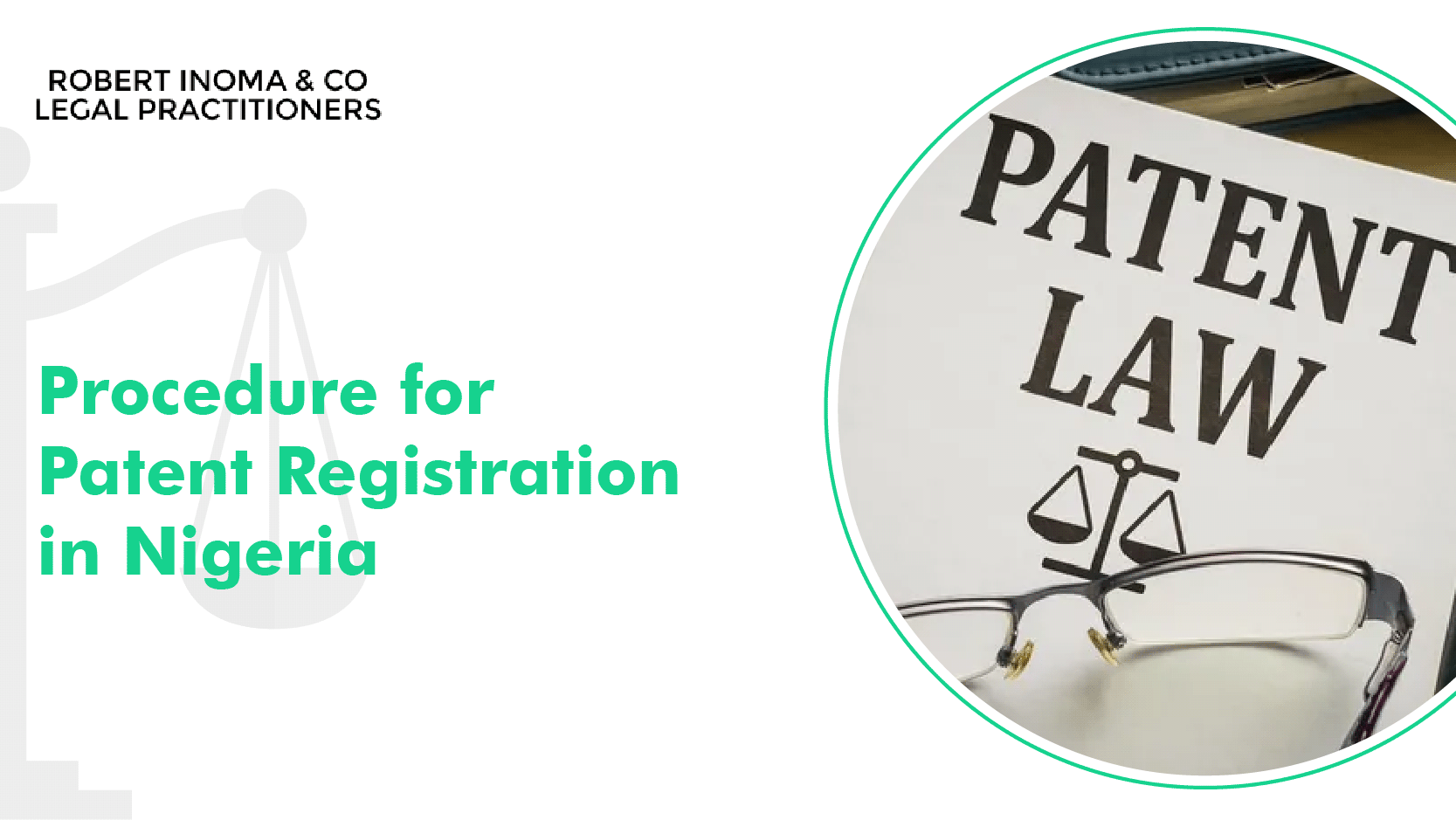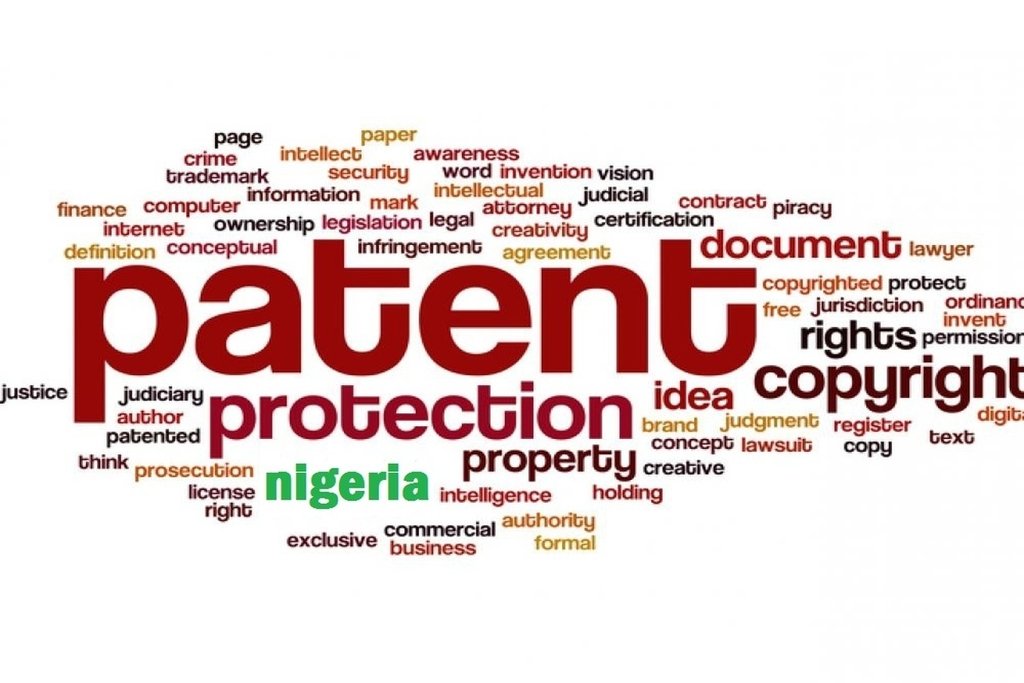All around the world, inventions are made from medical discoveries to inventions of electronic devices and applications. Systems have been created to protect people’s inventions from being copied or used wrongly. One of such intellectual property rights is Patent Right.
A patent is a type of intellectual property right that allows the owner to legally exclude others in the making, using, and selling of an invention for a limited period in exchange for publishing an enabling public disclosure of the invention. The patentee basically has a monopoly on his/her invention during the given time. In Nigeria, Patents are granted under the Patents and Designs Act of 1970. Cap 344 of Laws of the Federation of Nigeria 1990. In Nigeria, the patent holder can sue anyone who infringes on his or her patent right. Some business owners see patents as an essential competitive advantage for their business.
Patent serves as a means to protect concepts and ideas from misappropriation and piracy. In Nigeria, the patent had largely encouraged innovation. With lesser individuals being able to pirate the inventions of others, more people are creating innovative inventions.
Innovations are as a result of individuals who think out of the box, put in efforts and funds to produce an invention. It is only right that by law, their invention should be protected from wrong usage and piracy.
In this article, we’ll examine what a patent is, the purpose of a patent, the criteria, and procedure for the registration of patents in Nigeria, who is eligible to register patents in Nigeria, the benefits of registering a patent, duration of a patent license.
Purpose of Patent Right
Why is registration for Patent right important? A patent is largely economical. It helps encourage technological development in the country and assures monopoly rights to the inventor.
During the given period, after patent registration, the inventor will have a monopoly over its invention. This means that the inventor can derive maximum financial benefit from his invention. They, however, ensure that the invention can improve the quality of life to the citizens.
Criteria For the Registration of Patent in Nigeria

Patent Registration is crucial in protecting intellectual property or invention. According to the Patent and Design Act (the “Act”) in Nigeria, there are criteria for registering a patent in Nigeria.
1. New
The invention must be new and have an inventive step that is not obvious to someone with knowledge and experience in the subject. It must not have been ever made known or used by the public. An invention that constitutes an improvement upon a patented invention is also patentable.
2. Industrial Application
The invention must be capable of being made or used in some kind of industry. Before an invention can be patentable, it must be capable of usage in industry. It should be beyond an idea or a theory, it must have a product, device, or practical form.
3. Public Policy
It must not be against public policy or morality. This is a crucial criterion from the Patents Registry. When an invention goes against public policy or morality, it may be rejected during patent registration.
4. Single Invention per Registration
The application for Patent to the Registry must be for only one invention. However, it may include or have a connection with several products, manufacturing processes, or application of products.
5. Full disclosure
For an item to be patentable, there must be a clear and full disclosure of the details of the invention and the process involved in the invention.
Conditions/ Documents for Patent Registration
If an invention qualifies as patentable after passing the criteria for a patent, an application for patent can be made to the Registrar of Patents and Designs (the Registrar) containing the following documents:
(i) The full name and address of the applicant or an address for service within Nigeria, if the address is outside Nigeria.
(ii) A clear description of the invention alongside appropriate plan drawings.
(iii) Claim(s) for a number of applications, products, or processes relating to only one invention.
(iv) The prescribed application fees to be paid to the Registry
(v) Where necessary, a declaration of the true inventor of the product with the name and address, and a request to be mentioned as the inventor in the Patent.
(vi) The power of attorney authorizing the agent to submit a patent application on behalf of the applicant.
Procedure for Patent Registration in Nigeria

Here are the process and procedure for patent registration in Nigeria
1. Attorney/ Agent Application
The process for patent registration begins with the application filling. The attorney or agent receives the instruction to file a patent application at the Registry of Trade Marks, Patents, and Designs along with the relevant documents.
The documents include the specifications and claims, Deed of Assignment, abstract, authorization of agent form, Priority Document, and others. The Authorization of Agency form authorizes the agent or attorney to apply for a patent on behalf of the applicant. It allows the attorney or agent to file for a patent and deal with all issues pertaining to patent registration on behalf of the applicant.
2. Acknowledgement Letter
After the application has been filed, an official acknowledgement letter with the application number and local filing date would be immediately generated from the PTO’s online portal. If the application is done offline, it will take about 2-3 weeks for the Registry to generate the acknowledgement letter.
3. Additional Documentation
After the acknowledgement letter is issued, the attorney or agent can file any outstanding document at the PTO or upload it on its online portal. A period of three (3) months is given to applicants to file all outstanding documents. If all the necessary documents are not filed during this period, it may likely cause a refusal of the application.
4. The Registrar Reviews Application
After the three (3) months given for additional documentation, the Registrar examines the patent application in correlation to the requirements of the Act. The patent application according to the Act should carry the Applicant’s full name and address- if the applicant’s address is outside Nigeria, it should carry an address for service in Nigeria. It should also contain a clear description of the relevant invention with appropriate plans and drawings, it should be accompanied by the prescribed fee and other required documents.
5. Acceptance
If the Registrar is satisfied with the perquisites for patent registration, notification of acceptance will be issued and the patent will be granted without further examination. The Patent application is not subjected to substantive examination at the PTO. According to The Patents & Designs Act, there is no inclusion for substantive examination and no qualified examiner is available at the local PTO.
6. Issue of Patent
The Registrar then issues the patent by giving the patentee the Sealed Letters Patent- a ceremonial document that contains the following:
(i) The name and address of the patentee
(ii) The number of the patent in the order of grant
(iii) The patent application and grant dates
(iv) In the case where foreign priority is claimed, an indication will be attached in this document
(v) Application date and number where the claim is based
(vi) The name of the country it was made
(vii) The description of the invention alongside claims, drawings, and plans
(viii) The name and address of the real inventor (in some cases)
A patent gives the Patentee the right to exclude others from making, using or selling its product for personal use or sale. Where a patent is granted for an invention, it excludes others from applying for a patent for that product.
In Nigeria, a patent expires 20 years from the date of application filing and can expire before then if the annual fees are not paid. The annual fees fall due a year from the filing date.
Who Can Register a Patent?
According to Nigerian Law, only accredited individuals or companies like Robert Inoma & co can register patents for inventors. All individuals interested in registering for patents need to hire accredited agents to get their patents.
The Granting of Patent is governed by the Trademarks, Patents and Designs Registry, Commercial Law Department, Federal Ministry of Industry, Trade and Investment.
Benefits of Patent Registration

Patent registration has numerous benefits for business owners and inventors in Nigeria. Here are a few benefits of patent registration in Nigeria.
1. Monopoly
By registering for a patent, the patent holder will have exclusive rights over his/her invention. The patent holder has the legal right to stop others from using or pirating his/her invention and can permit those he deems fit to use such invention under agreed terms.
2. Legal Action on Infringement
Patent holders have the right to sue or take legal action against anyone who infringes on the registered invention(s). The patent holder can also make claims for damages on infringement of his/her patent right. Inappropriate cases, the court may also grant orders to restrain the offending party from further infringement of the patent holder’s rights.
3. Invention Right
With a patent, the patent holder can grant does he chooses, the license to use the invention or sell it. Licensing others to use that invention can be a source of revenue for the business in Nigeria.
Duration of a Patent in Nigeria
The patent expires 20 years from the date of filing. According to the Patent Act, a patent will also expire when the patent holder fails in payment of the prescribed annual patent fee. After the grace period of 6 months from the patent fee due date, such patent will expire.
Patent: Foreign Priority
Where a patent application has been made in another country and a corresponding patent application for the same invention is made in Nigeria, a foreign priority will suffice.
In this case, the latter application made in Nigeria will be treated as having been made on the same date where the earlier application made in the other country was made.
In determining the application which came earlier, the application made in the foreign country will be deemed as senior to the subsequent application provided it was also filed for registration in Nigeria, although at a later date than the local applicant.
In the case where a patent applicant seeks foreign priority in respect of an earlier application made in a foreign country (outside Nigeria), the Nigerian application must carry information such as date, number, country of application, and name of the earlier applicant.
The Registrar should also be provided with the certified copy of the earlier application within three (3) months of the Application made in Nigeria. Foreign Priority is only accorded to applications from convention countries.
Grant of Patents
The Registrar has the duty to examine patent applications and determine that which is suitable for a patent grant. The power of the Registrar is however limited because the grant of a patent largely depends on the procedural requirement of The Act. Once the requirements are met, a patent shall be granted without any further examination and the registrar will issue the patent certificate. After the patent is granted, the Registrar will subsequently publish a notification of the grant.
Conclusion
Patent registration has numerous advantages for inventors and business owners in Nigeria. Once an item has been granted a patent, it can become an asset and the patent holder will have an exclusive right to the use of the invention. It can also be licensed to others with permission from the patent holder.
Registration for patents in Nigeria is not too complex. Once the requirements and criteria are met, the patent will be issued without any extra examination. The agency is however very strict with its requirement, a patent will be rejected if it doesn’t fit the criteria or the required documents are not provided.
A patent expires after 20 years from the filling for application date and once it expires, it will fall into the public domain and all members of the public can use the invention for free.
A patent will also expire if the required annual fees are not paid after a grace period of six (6) months. A patent can only be registered by accredited attorneys or agents.
Robert Inoma & Co is a law firm with professional lawyers with a wealth of experience in Patent Registration, Trademark, Corporate Law, and others. Robert Inoma & Co is offering free patent registration services to businesses. This is our way of helping businesses and/or our clients during this pandemic period. To begin your free patent registration in Nigeria, contact us or visit https://globaleminent.com/



Post a Comment